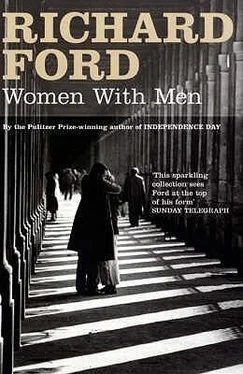Richard Ford - Women with Men
Здесь есть возможность читать онлайн «Richard Ford - Women with Men» весь текст электронной книги совершенно бесплатно (целиком полную версию без сокращений). В некоторых случаях можно слушать аудио, скачать через торрент в формате fb2 и присутствует краткое содержание. Год выпуска: 2006, Издательство: Bloomsbury Publishing PLC, Жанр: Современная проза, на английском языке. Описание произведения, (предисловие) а так же отзывы посетителей доступны на портале библиотеки ЛибКат.
- Название:Women with Men
- Автор:
- Издательство:Bloomsbury Publishing PLC
- Жанр:
- Год:2006
- ISBN:нет данных
- Рейтинг книги:3 / 5. Голосов: 1
-
Избранное:Добавить в избранное
- Отзывы:
-
Ваша оценка:
- 60
- 1
- 2
- 3
- 4
- 5
Women with Men: краткое содержание, описание и аннотация
Предлагаем к чтению аннотацию, описание, краткое содержание или предисловие (зависит от того, что написал сам автор книги «Women with Men»). Если вы не нашли необходимую информацию о книге — напишите в комментариях, мы постараемся отыскать её.
Women with Men — читать онлайн бесплатно полную книгу (весь текст) целиком
Ниже представлен текст книги, разбитый по страницам. Система сохранения места последней прочитанной страницы, позволяет с удобством читать онлайн бесплатно книгу «Women with Men», без необходимости каждый раз заново искать на чём Вы остановились. Поставьте закладку, и сможете в любой момент перейти на страницу, на которой закончили чтение.
Интервал:
Закладка:
But there was no one. The open lawn was empty, and it was nearly dark. He could see weak interior lights from the apartment blocks beyond the park fence, see yellow automobile lights on rue Vaugirard. He remembered once hunting with his father in Illinois. He was a boy, and their dog had run away. He had known the advent of dark meant he would never see the dog again. They were far from home. The dog wouldn't find its way back. And that is what had happened.
The park guardian stood in front of Austin, smiling, staring at his face oddly, searchingly, as if he meant to adduce something — if Austin was crazy or on drugs or possibly playing a joke. The man, Austin realized, hadn't understood anything he'd said, and was simply waiting for something he would understand to begin.
But he had ruined everything now. Léo was gone. Kidnapped. Assaulted. Or merely lost in a hopelessly big city. And all his own newly won freedom, his clean slate, was in one moment squandered. He would go to jail, and he should go to jail. He was an awful man. A careless man. He brought mayhem and suffering to the lives of innocent, unsuspecting people who trusted him. No punishment could be too severe.
Austin looked again at the yew bushes, a long, green clump, several yards thick, the interior lost in tangled shadows. That was where Léo was, he thought with complete certainty. And he felt relief, barely controllable relief.
“I'm sorry to bother you,” he said to the guardian. “ Je regrette. I made a mistake.” And he turned and ran toward the clump of yew bushes, across the open grass and the gravel promenade and careful beds in bright-yellow bloom, the excellent park. He plunged in under the low scrubby branches, where the ground was bare and raked and damp and attended to. With his head ducked he moved swiftly forward. He called Léo's name but did not see him, though he saw a movement, an indistinct fluttering of blue and gray, heard what might've been footfalls on the soft ground, and then he heard running, like a large creature hurrying in front of him among the tangled branches. He heard laughter beyond the edge of the thicket, where another grassy terrace opened — the sound of a man laughing and talking in French, out of breath and running at once. Laughing, then more talking and laughing again.
Austin moved toward where he'd seen the flutter of blue and gray — someone's clothing glimpsed in flight, he thought. There was a strong old smell of piss and human waste among the thick roots and shrubby trunks of the yew bushes. Paper and trash were strewn around in the foulness. From outside it had seemed cool and inviting here, a place to have a nap or make love.
And Léo was there. Exactly where Austin had seen the glimpse of clothing flicker through the undergrowth. He was naked, sitting on the damp dirt, his clothes strewn around him, turned inside out where they had been jerked off and thrown aside. He looked up at Austin, his eyes small and perceptive and dark, his small legs straight out before him, smudged and scratched, his chest and arms scratched. Dirt was on his cheeks. His hands were between his legs, not covering or protecting him but limp, as if they had no purpose. He was very white and very quiet. His hair was still neatly combed. Though when he saw Austin, and that it was Austin and not someone else coming bent at the waist, furious, breathing stertorously, stumbling, crashing arms-out through the rough branches and trunks and roots of that small place, he gave a shrill, hopeless cry, as though he could see what was next, and who it would be, and it terrified him even more. And his cry was all he could do to let the world know that he feared his fate.
8
In the days that followed there was to be a great deal of controversy. The police conducted a thorough and publicized search for the person or persons who had assaulted little Léo. There were no signs to conclude he had been molested, only that he'd been lured into the bushes by someone and roughed up there and frightened badly. A small story appeared in the back pages of France-Dimanche and said the same things, yet Austin noticed from the beginning that all the police used the word “moleste” when referring to the event, as though it were accurate.
The group of hippies he'd seen from Joséphine's window was generally thought to contain the offender. It was said that they lived in the park and slept in the clumps and groves of yews and ornamental boxwoods, and that some were Americans who had been in France for twenty years. But none of them, when the police brought them in to be identified, seemed to be the man who had scared Léo.
For a few hours following the incident there was suspicion among the police that Austin himself had molested Léo and had approached the guardian only as a diversion after he'd finished with the little boy — trusting that the child would never accuse him. Austin had patiently and intelligently explained that he had not molested Léo and would never do such a thing, but understood that he had to be considered until he could be exonerated — which was not before midnight, when Joséphine entered the police station and stated that Léo had told her Austin was not the man who had scared him and taken his clothes off, that it had been someone else, a man who spoke French, a man in blue and possibly gray clothing with long hair and a beard.
When she had told this story and Austin had been allowed to leave the stale, windowless police room where he'd been made to remain until matters could be determined with certainty, he'd walked beside Joséphine out into the narrow street, lit yellow through the tall wire-mesh windows of the gendarmerie. The street was guarded by a number of young policemen wearing flak jackets and carrying short machine pistols on shoulder slings. They calmly watched Austin and Joséphine as they stopped at the curb to say goodbye.
“I'm completely to blame for this,” Austin said. “I can't tell you how sorry I am. There aren't any words good enough, I guess.”
“You are to blame,” Joséphine said and looked at him in the face, intently. After a moment she said, “It is not a game. You know? Maybe to you it is a game.”
“No, it's really not,” Austin said abjectly, standing in the cool night air in sight of all the policemen. “I guess I had a lot of plans.”
“Plans to what?” Joséphine said. She had on the black crepe skirt she'd worn the day he'd met her, barely more than a week ago. She looked appealing again. “Not for me! You don't have plans for me. I don't want you. I don't want any man anymore.” She shook her head and crossed her arms tightly and looked away, her dark eyes shining in the night. She was very, very angry. Possibly, he thought, she was even angry at herself. “You are a fool,” she said, and she spat accidentally when she said it. “I hate you. You don't know anything. You don't know who you are.” She looked at him bitterly. “Who are you?” she said. “Who do you think you are? You're nothing.”
“I understand,” Austin said. “I'm sorry. I'm sorry about all of this. I'll make sure you don't have to see me again.”
Joséphine smiled at him, a cruel, confident smile. “I don't care,” she said and raised her shoulder in the way Austin didn't like, the way Frenchwomen did when they wanted to certify as true something that might not be. “I don't care what happens to you. You are dead. I don't see you.”
She turned and began walking away down the sidewalk along the side of the gendarmerie and in front of the young policemen, who looked at her indifferently. They looked back at Austin, standing in the light by himself, where he felt he should stay until she had gone out of sight. One of the policemen said something to his colleague beside him, and that man whistled a single long note into the night. Then they turned and faced the other way.
Читать дальшеИнтервал:
Закладка:
Похожие книги на «Women with Men»
Представляем Вашему вниманию похожие книги на «Women with Men» списком для выбора. Мы отобрали схожую по названию и смыслу литературу в надежде предоставить читателям больше вариантов отыскать новые, интересные, ещё непрочитанные произведения.
Обсуждение, отзывы о книге «Women with Men» и просто собственные мнения читателей. Оставьте ваши комментарии, напишите, что Вы думаете о произведении, его смысле или главных героях. Укажите что конкретно понравилось, а что нет, и почему Вы так считаете.












